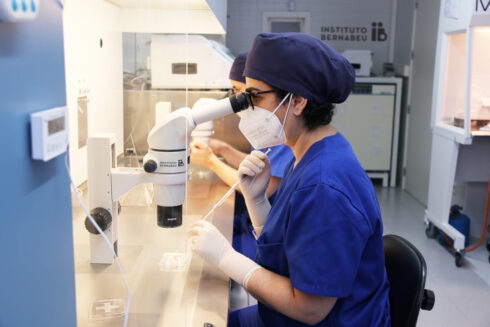SPAIN accounts for 15% of all in vitro fertilization (IVF) treatments in Europe, and has become the country with the highest volume of IVF cycles on the continent, with more than 165,000 cases per year.
Among the reasons for this Iberian dominance in the area of fertility are a general delay in the age at which women decide to become mothers, and favorable legislation that has allowed Spain to become an international benchmark in assisted reproduction.
Births in Spain are already at historic lows and are 24.3% less than the numbers reached ten years ago; this puts the population replacement rate at risk and leads to an unstable birth rate in the medium term.
One of the main causes that has led to an increase in access to assisted fertility techniques such as IVF is that births to mothers aged 35 and over have increased by 15.7% in the last decade and have gone from representing 35.1% of all births to 40.1% in 2023.
Also noteworthy is the range of women giving birth after the age of 40, which in this period has grown by 18.7% and already represents 8.1% of all births.
‘Social change is reflected daily in the consultations at our clinics. The search for a first child is increasingly delayed and we must bear in mind that the chances of becoming a mother after the age of 35 are drastically reduced, but after the age of 40, this probability is less than 20%’, explains Dr. Cristina García-Ajofrín, medical coordinator of the Instituto Bernabeu Madrid.

According to the latest data provided by the Spanish Fertility Society (SEF in Spanish), a total of 165,453 IVF cycles were registered in Spain in 2021. These allowed 40,638 babies to be born, which is equivalent to 12% of the total number of births in the country in that year. However, the results of Spanish reproductive medicine transcend borders and our country receives thousands of people from all over the world who come to us in order to have offspring.
IVF leaders in Europe
Spain leads Europe in the volume of in vitro fertilization (IVF) treatments, performing 15% of the European total and positioning the Iberian country as an international reference center for assisted reproduction treatments.
Thus, according to the latest report by the European Society of Human Reproduction and Embryology (ESHRE), Spanish clinics surpass France, which accounts for 12.9% of IVF treatments, and Germany, which performs 11.6% of continental treatments. Italy and the United Kingdom complete the Top 5, with 9.2% and 7.6% respectively of IVF treatments in Europe.
Among the reasons why we are leaders in IVF are the high quality of the assisted reproduction centers and their researchers, the accessibility offered to foreign patients seeking to fulfil their dream of becoming parents and, above all, the development of advanced legislation that promotes scientific and technical progress. It is a reference both for the techniques it regulates and for the favorable legal environment that supports and protects the rights of patients, providing security and confidence in the
process and also guaranteeing total anonymity in gamete (egg and sperm) donations.
This means that, year after year, thousands of foreigners come to Spain to undergo fertility treatments. According to Instituto Bernabeu data, more than 55% of patients undergoing fertility treatments in Spain are foreigners of more than 135 different nationalities.

Patient profiles are diverse. Many of those who come to Instituto Bernabeu’s clinics do so because in their countries they cannot access certain treatments to have a baby or to undergo certain diagnostic tests, such as PGT-A, a test that allows to detect and prevent the transmission of serious diseases caused by genetic alterations to the embryo.
This is the case, for example, of single mothers, lesbian couples or future parents who wish to access a safe and anonymous egg or sperm donation program.
‘Others come to us after a long journey in their country and are looking for a last chance. Our success rates are a key element in their decision, although when they come to us what they most emphasize is the quality of medical and care they receive with us,’ according to Dr García-Ajofrín.
The average age of patients attending assisted reproduction clinics in Spain, such as Instituto Bernabeu, is growing steadily and currently stands at 40 years old.
If we take into account those who have to resort to oocyte donation treatments, the age exceeds 42.2 years. This figure reflects the growing tendency of women to postpone childbearing, seeking assisted fertility options later in life.
About Instituto Bernabeu
For 40 years, Instituto Bernabeu has been at the forefront of research in reproductive medicine.
The group of specialized clinics is led by doctors Rafael and Andrea Bernabeu and its team of researchers is present at the most important congresses in the world. Its 9 clinics, located in Madrid, Alicante, Palma de Mallorca, Albacete, Cartagena, Elche, Benidorm and Venice, annually attract patients from all over the world, specifically from 137 countries.
This renowned Spanish institution has a long history and its milestones include the birth of a child using spermatids for the first time in Spain and the sixth in the world, and the recent creation of the first Artificial Intelligence (AI) unit dedicated to reproductive medicine.
Every day 3 babies are born in the world thanks to the professionals of Instituto Bernabeu, which has already surpassed 150,000 clinical records since its foundation.








